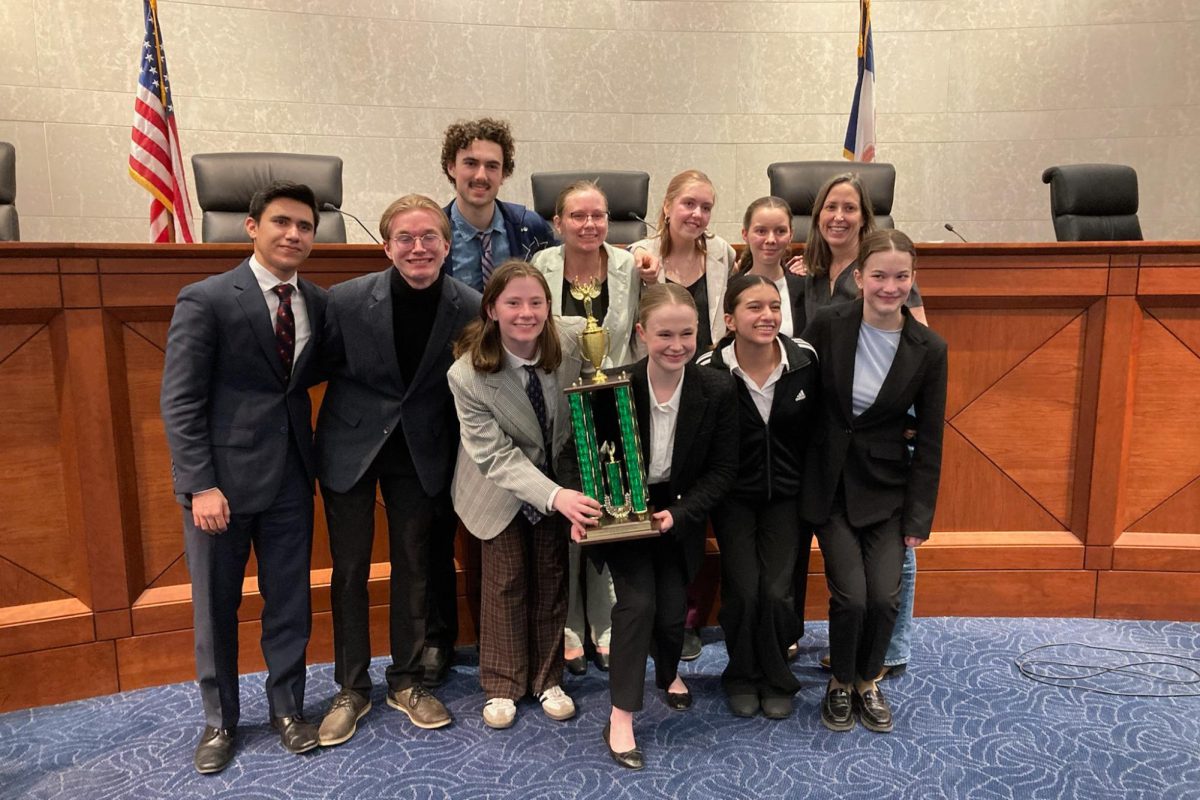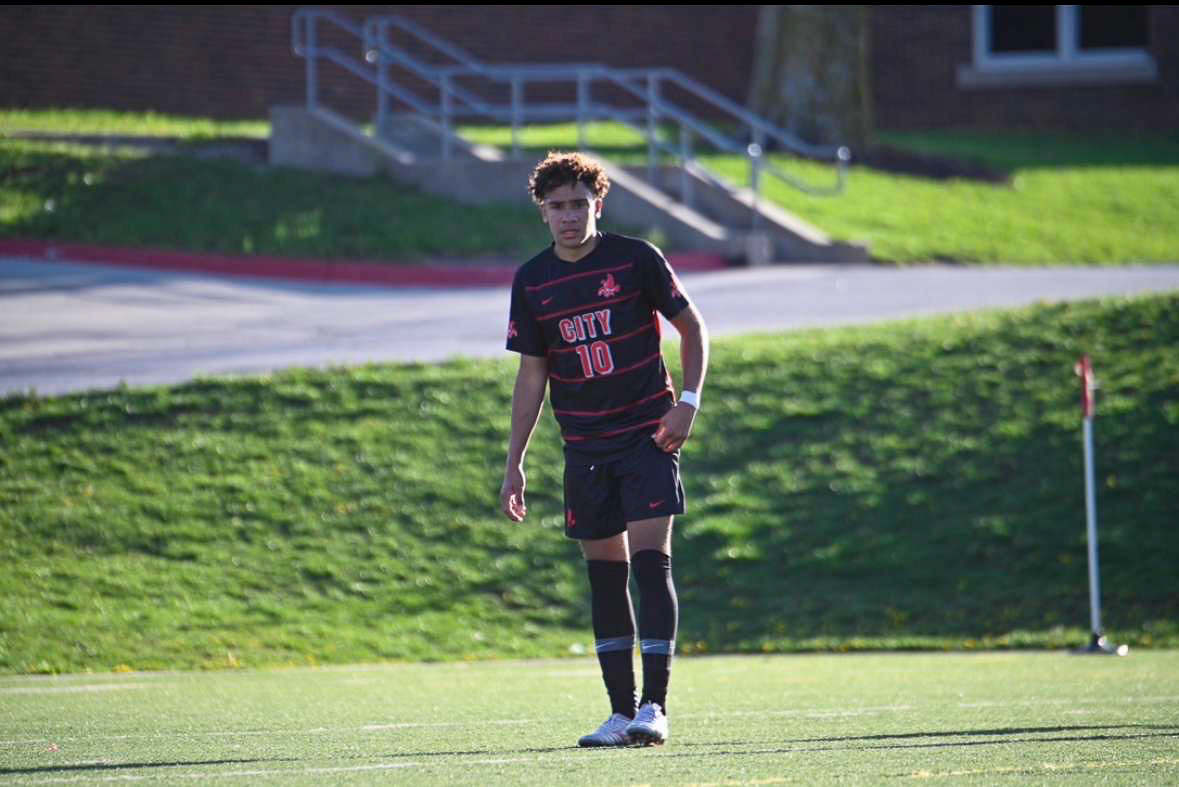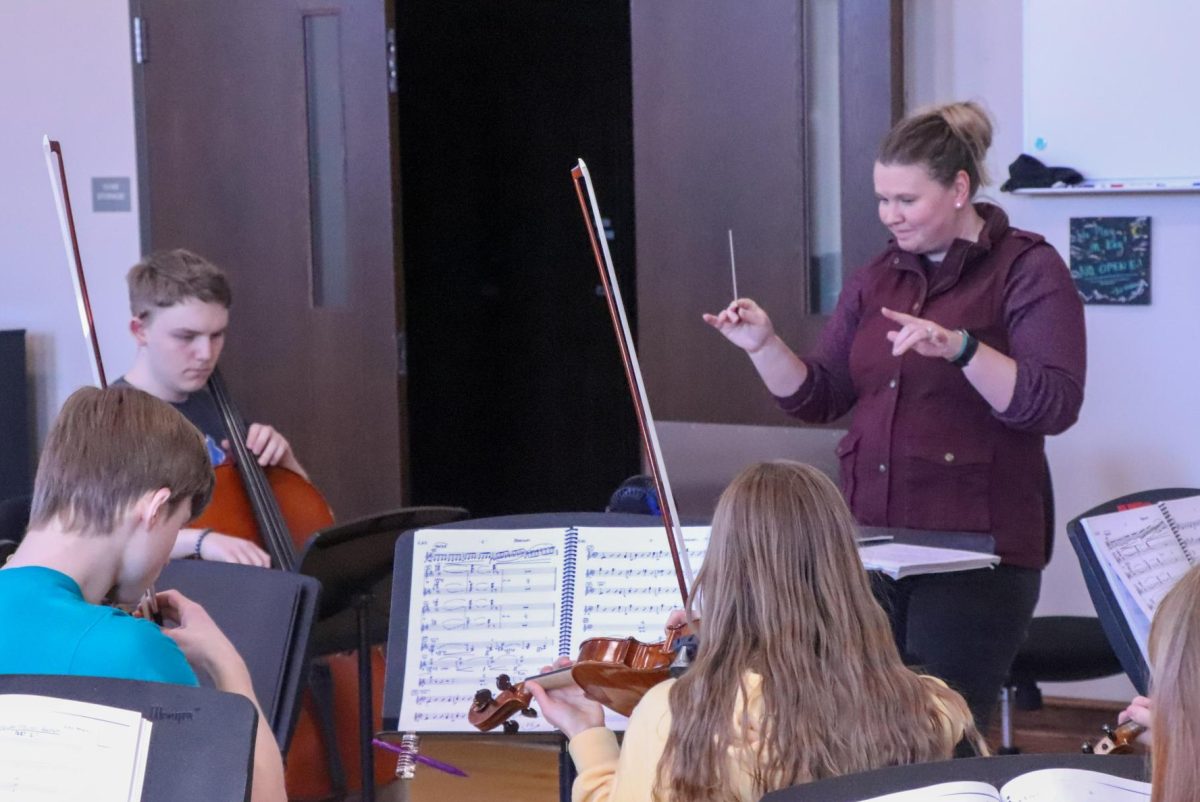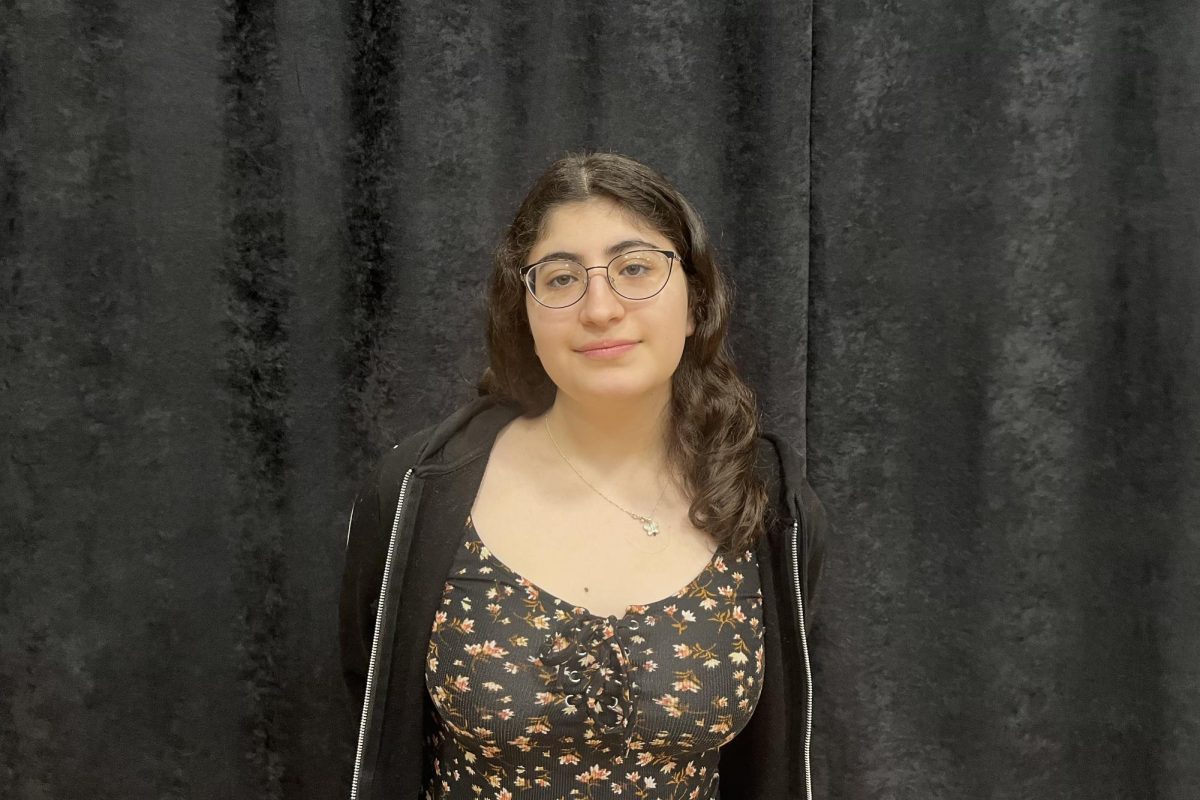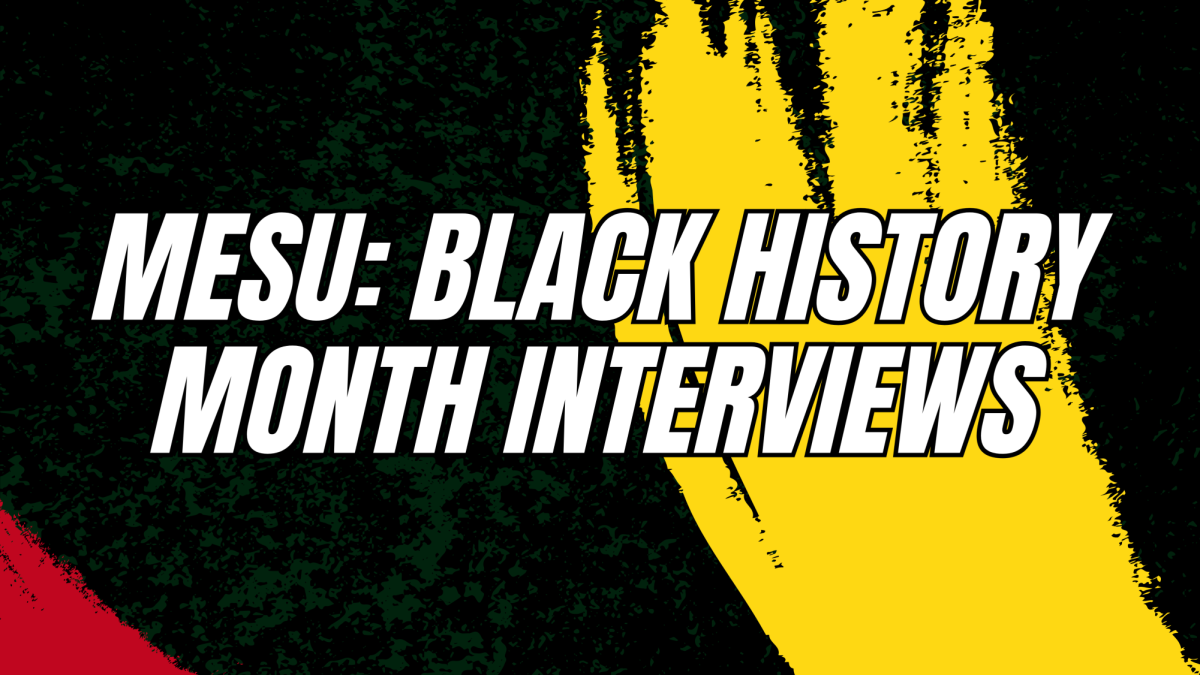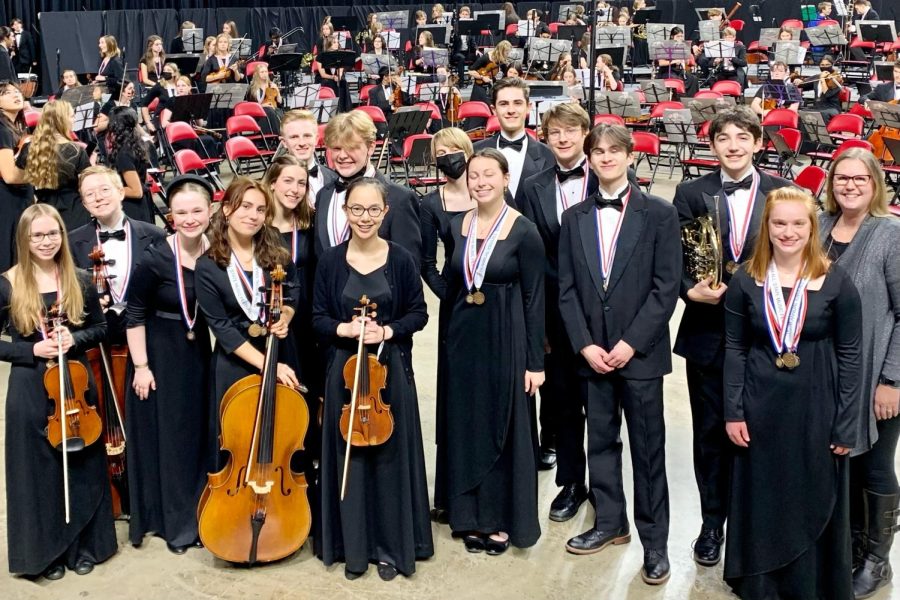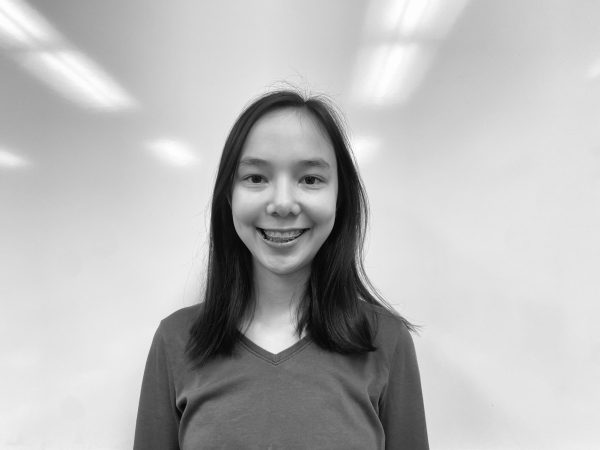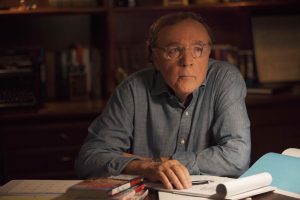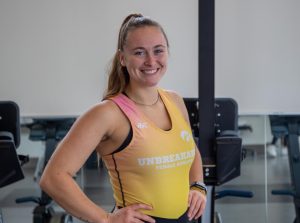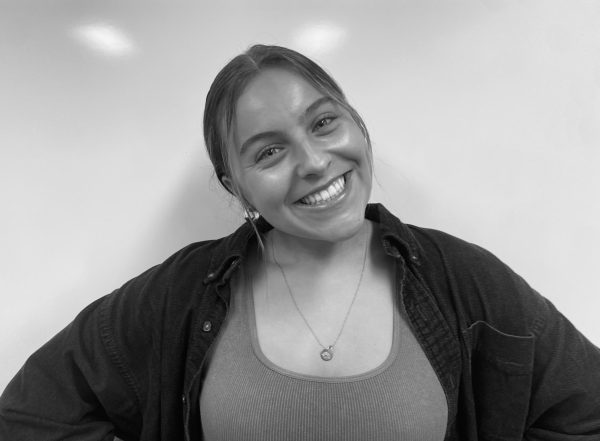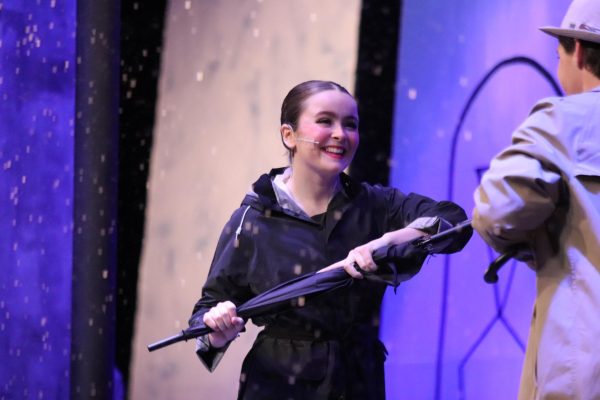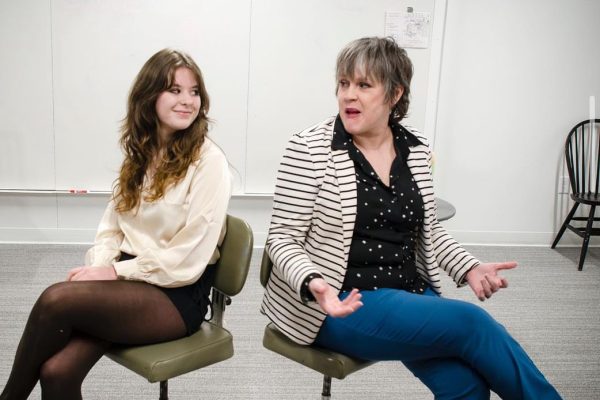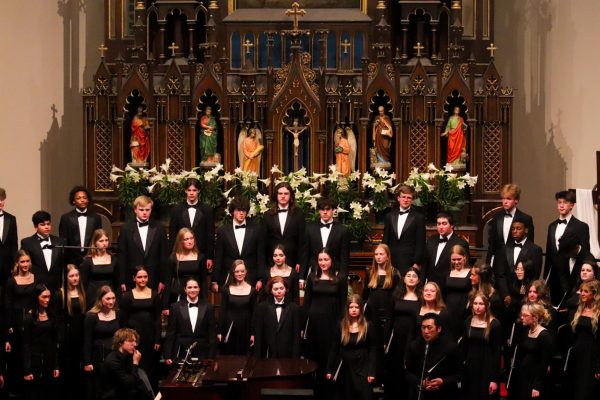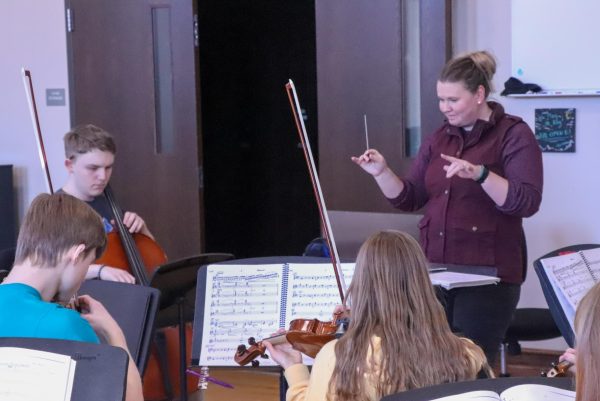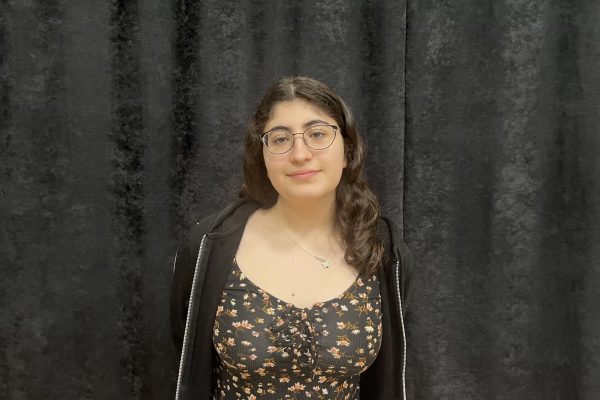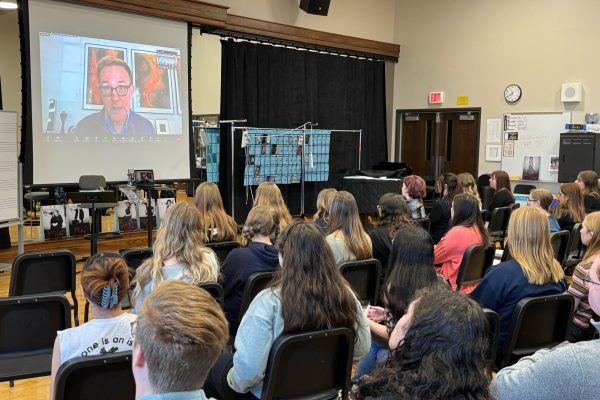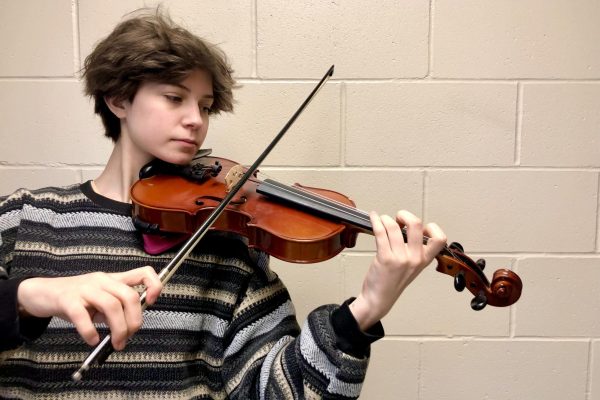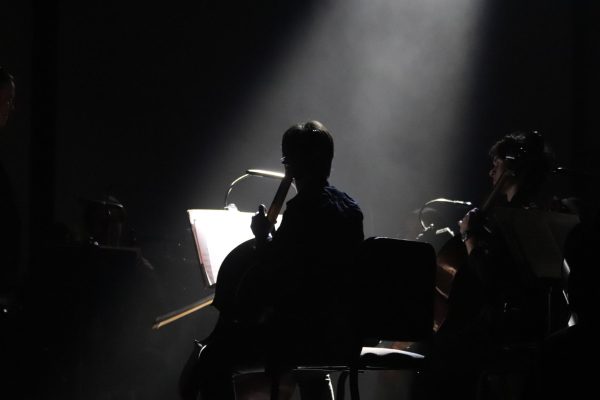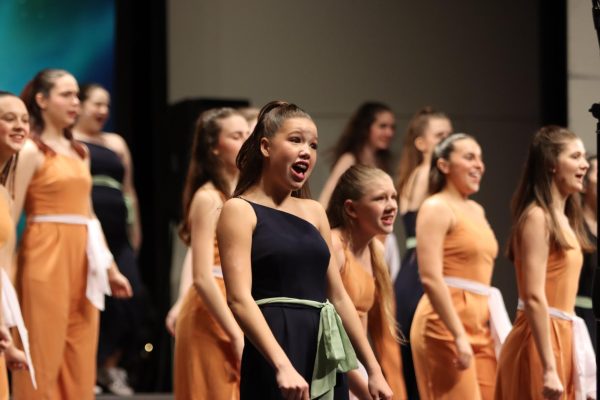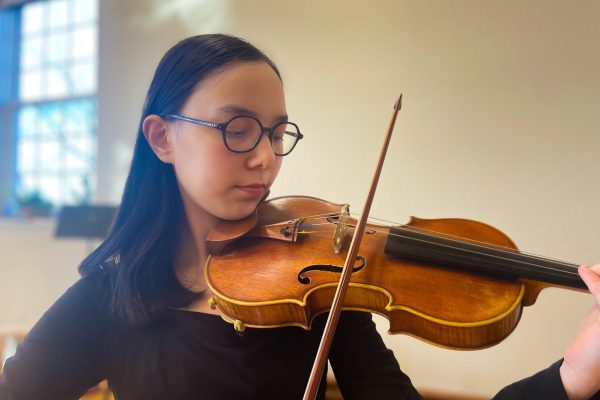Students Perform at All-State
Orchestra members Abigail Sigafoose ’26, Sebastian Sauder ’24, Esther Puderbaugh ’25, Marina Escandell-Tapias ’24, Greta Stanier ’23, Adam Zeithamel ’23, Thomas Shey ’24, Tai Caputo ’25, Lucy Charis-Carlson ’24, Kalea Seaton ’24, Isaac Bullwinkle ’23, Leo Burchett ’24, Henry Smith ’24, Matisse Arnone ’23, Monique Schnoebelen ’23, and Ms. Stucky-Swanson at All-State
December 2, 2022
On November 19th, 30 City High students performed at the 2022 All-State Music Festival Concert in an arena large enough to hold over 14,000 spectators, Hilton Coliseum, at Iowa State University.
Located in Ames, the annual three-day event included more than 1,000 orchestra, band, and choir students from 150 public and private high schools across the state, the top 2% of music students statewide.
The students from City High School rode a bus to Ames on Thursday, November 17th. They stayed at nearby hotels, ate cafeteria food, and explored the Iowa State campus. After an initial audition for chair placements, they rehearsed all the next day, and performed on Saturday, the 19th of November.
Matisse Arnone ‘23, a French horn player, said that he learned a lot from the experience, and that he liked the way the conductor taught in rehearsals. When people all come prepared, and especially when they all come wanting to be there, and wanting to actually rehearse, then they’re way more productive. — Matisse Arnone
“I think you can tell [the conductor is] super focused on what he’s doing, and that energy is replicated by the orchestra, and I think we have very focused rehearsals. I’m learning how a good group can rehearse well,” Arnone said. “At school, in our rehearsals, a lot of time is spent focusing on getting individual parts done, because people aren’t practicing as much for their school groups. But when people all come prepared, and especially when they all come wanting to be there, and wanting to actually rehearse, then they’re way more productive.”
Band students at All-State are sorted at the first audition into either the All-State band or the symphony orchestra. Last year, Arnone was in the band, but this year he was in the orchestra. He said he enjoyed comparing the two.
“The way the orchestra conductor works with an orchestra is very different from the band approach to things,” Arnone said. “I feel you can learn things from both approaches. [For example] in orchestra the conductor talks to the strings about bow usage, which I can’t really relate to, but some of the points that he’s making about why using the bow–as in to do with articulation or like saving dynamics–can be related to wind instruments, because it’s very similar to using air.”
Arnone said that being in the full orchestra enabled him to get to know all of the people in his section.
“It’s really nice [being in orchestra], because last year in band, the horn section was huge, so you can’t really meet anybody, but this year I actually know everybody’s name in my section,” Arnone said. “During our chair placement auditions, we hung out in a circle together and got to know each other a little bit.”
Students’ first audition to get into All-State in October was viewed by a single judge, but this second audition, consisting only of orchestral excerpts, was blind, with three judges behind a screen.
Kalea Seaton ‘24, a violist, said she felt more nervous because she couldn’t see the judge.
“Honestly, I prefer auditions that are not blind,” Seaton said. “I think it makes it less nerve-wracking when I can see that there’s an actual person there.”
Nevertheless, Seaton said she was glad to have the chance to audition and that she had gained confidence from auditioning last year.
“Learning to play under pressure really helps my playing for future scenarios that I might be in,” Seaton said. “[Last year] I was just so nervous that I couldn’t really play, and so this year, I thought I did a good job of calming down, and just playing the music.”
Seaton appreciated the chance to be able to participate in such an advanced orchestra.
“I think it’s fun to just get to perform with some of the best high school musicians in the state. And also, just playing with an actual full orchestra is really fun. And it’s really cool to meet new people from other places,” Seaton said.
Seaton appreciated the chance to learn more about individual practicing from the orchestra conductor, Allen Tinkham.
“I think that the conductor keeps going on these little tangents about different things and I think it’s nice. I think it’s cool that he has so much to share,” Seaton said. “[For example,] he has been giving tips on how to practice, even though we’re in a big rehearsal, and we’re not gonna really be practicing this particular music on our own, he’s giving us a lot of tips on the most efficient way to practice, and so I think it’s really cool that he’s taking the time to tell us about these things to help us improve in the future.”
Students were required to rehearse for up to seven and a half hours on the day before the concert. Although Seaton felt that the rehearsal time was rather long, she still had a good time.
“I think just the amount of rehearsal can be a little overwhelming, and it’s definitely tiring to be rehearsing for such long hours,” Seaton said. “But at the same time, I think it’s also really fun, and it’s a cool experience.” I feel like auditions aren’t like an accurate representation of what you can play. . . But it was less scary this year, because I felt more prepared going into it after last year. — Liv Leman
Liv Leman ’25, a bass clarinet, said that this is her second time getting into All-State. She said that the scariest part about All-State was its auditions.
“I feel like auditions aren’t like an accurate representation of what you can play. ’Cause it’s just this little time [when] the judge listens to you, so it’s really intimidating, because if you mess up, it might not be how good you actually are, but it’s how good the judge thinks you are, and that can result in you not making it,” Leman said. “But it was less scary this year, because I felt more prepared going into it after last year.”
Ms. Stucky-Swanson, orchestra director at City High, served as a judge in the first violin audition (violins at All-State are divided into two groups, firsts and seconds). Stucky said that the strings at All-State were very strong this year.
“[They] really responded to the conductor well, especially in the Bach [Kom Süsser Todd],” Stucky-Swanson said. “I think that by the end of the hours and hours of rehearsal, having to remain musical, and follow the conductor, and not let your muscles take control over how sore you are, takes a large amount of maturity to do correctly, and the strings did that. It was beautiful.”
Stucky-Swanson pointed to advantages that students gain from auditioning for All-State.
“[Students who audition for All-State] gain so much more technique,” Stucky-Swanson said. “Even if they’re not accepted into All-State, they have still learned very difficult excerpts from real orchestral literature. So nobody can take that away from them, regardless of the outcome. But it’s also really nice for the students to experience the large ensemble, different conductors, something that’s outside of the normal routine.”
Stucky-Swanson’s recommendation to students applying to All-State next year is to listen to recordings of the pieces.
“Judges will know within ten seconds if you understand how your part fits into the rest of the symphony,” Stucky-Swanson said. “Listening to the music is just as important as practicing the music.”
Although All-State requires a significant time commitment, Stucky-Swanson appreciated the opportunities to work with her students that don’t arise in school.
“I love the concert, and I love watching my students. But I also really enjoy the little moments of running into the kids in the hallway in the hotel, or hearing about their day, and all of their stories from the day. I like having those connections that I don’t normally get to have at school.”





